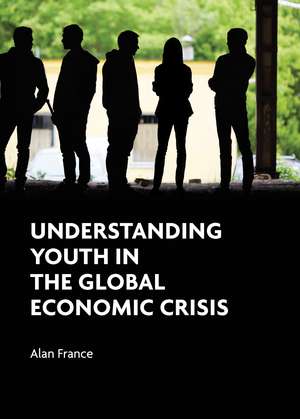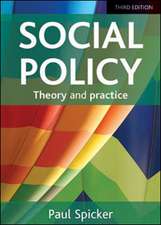Understanding Youth in the Global Economic Crisis
Autor Alan Franceen Limba Engleză Paperback – 23 mar 2016
In this innovative book, Alan France looks not at the economic impact of the global economic crisis and great recession of the past decade, but at the effect these forces have had on our very understanding of youth through its associated institutions. Using eight countries as case studies, he undertakes an in-depth sociological analysis of historical and contemporary developments in secondary education, training, work, and welfare policy to show how the ecological landscape of youth has been affected. Mapping the growing influence of neoliberalism as a political strategy in each of the countries, he shows how, after the crisis, the reconfiguration of institutions and practices that are central to the lives of the young is accelerating, bringing new meaning to youth, age, transition, diversity, risk, and inclusion.
| Toate formatele și edițiile | Preț | Express |
|---|---|---|
| Paperback (1) | 298.70 lei 3-5 săpt. | |
| Bristol University Press – 23 mar 2016 | 298.70 lei 3-5 săpt. | |
| Hardback (1) | 779.01 lei 6-8 săpt. | |
| Bristol University Press – 23 mar 2016 | 779.01 lei 6-8 săpt. |
Preț: 298.70 lei
Nou
Puncte Express: 448
Preț estimativ în valută:
57.17€ • 62.12$ • 48.06£
57.17€ • 62.12$ • 48.06£
Carte disponibilă
Livrare economică 31 martie-14 aprilie
Preluare comenzi: 021 569.72.76
Specificații
ISBN-13: 9781447315766
ISBN-10: 1447315766
Pagini: 224
Dimensiuni: 171 x 241 x 18 mm
Greutate: 0.46 kg
Editura: Bristol University Press
Colecția Policy Press
ISBN-10: 1447315766
Pagini: 224
Dimensiuni: 171 x 241 x 18 mm
Greutate: 0.46 kg
Editura: Bristol University Press
Colecția Policy Press
Notă biografică
Alan France is professor of sociology in the School of Social Sciences at the University of Auckland in New Zealand. He is coauthor of, most recently, A Political Ecology of Youth and Crime.
Cuprins
About the author
Acknowledgments
Introduction
1. A political ecology of youth
2. The global crisis and the ‘age of austerity’
3. Education and training: the broken promise
4. Education and training: from public to private responsibility
5. Unemployment and work: precarious futures
6. NEETs and the disengaged: the ‘new’ youth problem
7. Divergence and difference: contrasting cross-national experiences of being young
8. Education, work and welfare in diverse settings
9. Youth and mobility: inequity, leaving home and the questions of youth migration
10. After the crisis: social change and what it means to be young
References
Index
Acknowledgments
Introduction
1. A political ecology of youth
2. The global crisis and the ‘age of austerity’
3. Education and training: the broken promise
4. Education and training: from public to private responsibility
5. Unemployment and work: precarious futures
6. NEETs and the disengaged: the ‘new’ youth problem
7. Divergence and difference: contrasting cross-national experiences of being young
8. Education, work and welfare in diverse settings
9. Youth and mobility: inequity, leaving home and the questions of youth migration
10. After the crisis: social change and what it means to be young
References
Index
Recenzii
“With a rare, global perspective, this is a timely, valuable, and important book that maps the social and economic fortunes and likely futures of young people after ‘the Great Recession.’”
"One of the strengths of the book—and the key to its undoubted value to non-academic readers—is France's mastery of both the detail of social policy, and how policy interacts with lives actually lived by today's young people."
“An extremely timely analysis of the conditions faced by young people in the period following the Great Recession. With a strong theoretical foundation and an excellent empirical coverage of eight countries within the Global North, France explores the everyday worlds inhabited by young people, at the same time reminding us of the persistence of old inequalities and of the ineffectiveness of core policies.”
“This book is essential reading for anyone who wants to understand what the global financial crisis means for young people—it has astounding depth and breadth and sets new agendas in the field of youth studies.”













